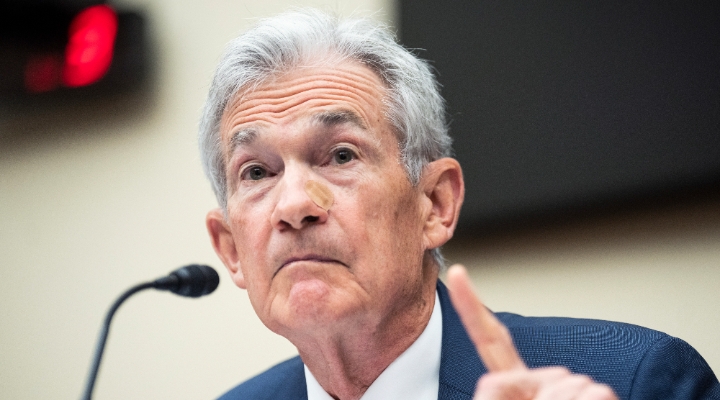(Alliance News) - UK Chancellor Rachel Reeves has described a planned average 21% increase to water bills as a "bitter pill" for consumers amid the sewage pollution scandal and cost-of-living crisis.
Household water bills in England and Wales are to rise by an average GBP19 a year over the next five years – a third less than the increase requested by companies, under draft proposals announced by Ofwat.
Reeves promised the government will "get a grip" on the water sector, saying: "It's clearly a bitter pill for people who are seeing today's announcements about higher water bills.
"This reflects 14 years of failure from the Conservatives to drive investment to reduce pollution, and to ensure that families are not struggling the way that they have been with the cost-of-living crisis."
She added: "It's why the Secretary of State for Environment, Steve Reed, has called in the 16 bosses of the water companies today.
"Also, we've already announced tough new rules to ensure that money that is supposed to go into infrastructure cannot just be paid out in bonuses, and tougher rules around polluting as well.
"We're determined to get a grip on the water sector so it delivers for consumers, and so that we stop polluting our beautiful seas and rivers. We will get a grip of that."
The regulator said water firms had proposed increases averaging GBP144 over five years.
For example, Thames Water's planned rise of GBP191 by 2030 has been reduced to GBP99, while Severn Trent's proposed increase of GBP144 has been cut to GBP93.
There are significant variations in price changes between suppliers.
Under the plans, Southern Water customers will face a GBP183 increase over five years, while Dwr Cymru customers' bills will go up by GBP137 and Yorkshire Water customers will pay GBP107 more.
At the other end of the scale, Affinity customers will see just an GBP11 rise, while SES customers' bills will fall by GBP34 on the previous five years.
Ofwat Chief Executive David Black said: "Customers want to see radical change in the way water companies care for the environment. Our draft decisions on company plans approve a tripling of investment to make sustained improvement to customer service and the environment at a fair price for customers.
"These proposals aim to deliver a 44% reduction in spills from storm overflows compared to levels in 2021. We expect all companies to embrace innovation and go further and faster to reduce spills wherever possible.
"Today's announcement also increases the resilience of our water supplies to the impact of climate change and will reduce how much water is taken from rivers by enabling a range of long-term water supply projects, which includes plans for nine reservoirs.
"Let me be very clear to water companies – we will be closely scrutinising the delivery of their plans and will hold them to account to deliver real improvements to the environment and for customers and on their investment programmes."
A Water UK spokesman said: "Today's announcement is the biggest ever cut in investment by Ofwat. If it doesn't put this right Ofwat will be repeating the mistakes of the past. As a direct result, more housing will be blocked, the recovery of our rivers will be slower and we will fail to deal with the water shortages we know are coming.
"Water companies proposed to invest GBP105 billion because it is the minimum needed to meet the legitimate concerns we've heard from the public about our environment and our economy.
"Ofwat is right to want to ensure customers receive value for money and that is why protections are in place to ensure customers only pay for projects that are new, necessary and value for money.
"But for far too long Ofwat has failed to be realistic about the levels of investment needed and what it will take to deliver and maintain necessary infrastructure. We cannot allow this pattern to repeat itself.
"Water companies are ready to invest in an unprecedented overhaul of the country's water and sewage infrastructure. Ofwat now needs to let them get on with it."
Mike Keil, chief executive of the Consumer Council for Water (CCW), said: "Millions of people will feel upset and anxious at the prospect of these water bill rises and question the fairness of them given some water companies' track record of failure and poor service.
"Customers understand investment is urgently needed but they need reassurance that every pound of their money is going to be well spent.
"Trust in water companies has never been lower and that won't change until people see and experience a difference – whether that's having the confidence to swim at their favourite beach or receiving help if they are struggling to pay their bill.
"We estimate about two million households in England and Wales currently cannot afford their water bill and, while the increase in financial assistance is welcome, it falls short of what is needed.
"Over the summer we'll be carrying out research with customers of every water company to gauge whether they feel the regulator's proposals are affordable and deliver what people want. We expect Ofwat to listen and act on what customers tell us."
The proposals are part of the 2024 Price Review (PR24) and cover the period from April 1, 2025 to March 31, 2030, ahead of a final decision at the end of the year.
Ofwat said the average 21% bill increase, around GBP19 per year, follows firms' proposals to increase their total spending by GBP29 billion, split between a GBP5 billion increase in the core costs for running their business and a GBP24 billion rise in spending to meet requirements set by governments and for other environmental improvements.
Ofwat said its scrutiny of companies' cost proposals, to ensure they deliver efficiently, has led to a GBP16 billion reduction.
However the proposed bill increases come amid public fury around firms' polluting of waterways with sewage spills as they continue to hand dividends to shareholders, and bonuses to executives – something which Labour has pledged to clamp down on.
Sewage spills into England's rivers and seas more than doubled in 2023.
According to the environment agency, there were 3.6 million hours of spills last year – equal to about 400 years – compared with 1.75 million hours in 2022.
The large amount of water lost to leaks in the system also raises widespread concerns, particularly in dry periods when consumers face hosepipe bans.
By Josie Clarke, PA Consumer Affairs Correspondent
Press Association: Finance
source: PA
Copyright 2024 Alliance News Ltd. All Rights Reserved.

























